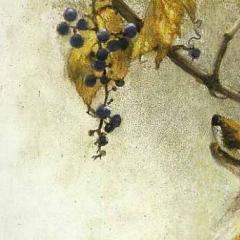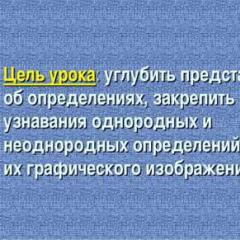Fyodor Ivanovich Tyutchev interesting facts. Interesting facts about Tyutchev. Biography of Tyutchev, the most important things briefly
Four loves of a poet
During the diplomatic period in Munich, 23-year-old Tyutchev met the young beauty Amalia Lerchenfeld. IN different times Pushkin and Heine, the Russian monarch Nicholas I and the Bavarian king Ludwig were passionate about it. But the wayward beauty did not reciprocate any of them. But the helpful Tyutchev managed to win her heart. However, they were not destined to stay together - Amalia was soon married to Baron Krudener. Tyutchev did not forget his youthful love. The poems “I Met You...” and “I Remember the Golden Time...” are dedicated to Amalia Krüdener.The poet's first wife, Eleanor Peterson, was 4 years older than him. When Fyodor Ivanovich married her, Eleanor was a young widow with four children. In her marriage to Tyutchev, Eleanor had three more daughters. The eldest Anna later became the wife of the famous Russian writer Ivan Sergeevich Aksakov.
After the untimely death of his first wife, Fyodor Ivanovich Tyutchev married the beautiful Baroness Ernestine Dernberg. Interestingly, one day at a ball in Munich, Ernestina’s first husband felt ill and decided to go home alone. Then he turned to the young Russian, with whom the baroness was just speaking, with the words: “I entrust my wife to you.” Needless to say, this young man was Tyutchev. Soon Baron Dernberg died of typhus.
Tyutchev's last love, Elena Denisyeva, was 23 years younger than the poet and studied at the Smolny Institute for Noble Maidens with his two eldest daughters. Their long love affair, from which three children were born, caused universal condemnation in society. Perhaps it was the ambiguity of the situation and the ill will of those around her that killed Elena, who died of tuberculosis at the age of 37. Tyutchev's legal wife, Ernestina, knew about his husband's relationship with another woman and even allowed him to give his surname to his illegitimate children. The poet dedicated the most poignant cycle of his love poems to Elena Deniseva.
This is how ambiguous, full of love passions and experiences, was the life of the great Russian poet Fyodor Ivanovich Tyutchev.
Today Fyodor Ivanovich Tyutchev is revered as a great Russian poet, publicist and diplomat. In the memoirs of his contemporaries, he seemed different - a child prodigy, a rebel, a wit, a darling of fate and “almost a foreigner.” So who was he really? Interesting facts about Tyutchev allow us to delve deeper into the history of the great master’s life and work.
Briefly about the facts of the poet's biography
- The future statesman was born on November 23 (December 5), 1803, on the family estate of Ovstug, which was located in the Oryol province. This event took place in the family of Ivan Nikolaevich Tyutchev, court councilor and his wife Ekaterina Lvovna Tolstoy. In addition to Fedor, two more children were born in the family - son Nikolai and daughter Daria.
- It is interesting to note that the Tyutchevs belonged to an ancient noble family. Thus, even in the Nikon Chronicle, Zakhar Tutchev was mentioned, whom Dmitry Donskoy ordered to ingratiate himself with Khan Mamai and obtain information that was very valuable in the light of the upcoming Battle of Kulikovo. Another famous ancestor of the Russian poet is Boris Tyutchev. During the reign of Ivan the Great, he took part in the brutal pacification of the Pskov rebels.
- However, there were other family legends. According to them, the Tyutchev family had other roots, but which ones - French or Italian - have not been precisely established. Perhaps the poet’s enthusiastic words about Nice are not just rhymed emotions and moods of the author, but a real “call of blood.”
- Little Fedor grew up a real darling of fate. He received an excellent education at home. His unique abilities never ceased to be surprised and admired. And in fact this was not an exaggeration. When the boy was fourteen years old, the Society of Lovers of Russian Literature accepted him into its ranks. Moreover, not just like that, but for specific merits - a wonderful poetic translation of Horace’s letters. But that's not all. Exactly a year later, at the age of 15, he entered Moscow University, and at 18 he graduated with a candidate’s degree. The direction is unchanged - literature.
- IN further direction his activities have changed dramatically. Immediately after receiving his university certificate, Tyutchev was offered the position of freelance attaché at the Russian diplomatic mission in Munich. He happily agreed.
- In 1839, Tyutchev was recalled from his position. What caused it is unknown. In 1844 he returned to his homeland. Unexpectedly for everyone, the disgraced Tyutchev received new position– Chief Censor at the Ministry of Foreign Affairs Russian Empire, and the rank of civil servant.
- New place - new achievements. Tyutchev was involved in the work of shaping a positive image of Russia in the West. It should be noted that he coped with this task very successfully. A number of his articles are published in Europe French dedicated to the relationship between Russia and everything Western world. European inquisitiveness was largely satisfied thanks to Tyutchev’s talent: unknown and unexplored Russia became, albeit a little, clear and understood.
- However, here is a paradox: everyone who ever encountered him said one thing - “almost a foreigner.” They did not exaggerate or embellish. He lived in Europe for more than twenty years, spoke French fluently, moreover, more often than native language, and everything about him, from his appearance to his manners, spoke of belonging to a non-Russian culture. At the same time, Russian literature, consciousness and all culture are unthinkable without Tyutchev.
- In the biography of Tyutchev, many interesting facts from life are known. For example, as chief censor, he imposed a ban on the translation and further distribution of the Manifesto in Russia. communist party» Karl Marx. He explained his decision briefly, but succinctly and directly: those who want to get acquainted with the document will find the opportunity to read it in German, but for the rest it’s pure “pampering.”
- There were legends about Tyutchev's frivolity and inimitable wit. For example, many people knew about the love affairs of Nicholas I, but only Fyodor Ivanovich dared to call them “cornflower blue eccentricities.” At that time, the prank was dangerous, which could have resulted in exile, but unexpectedly he got away with it: the emperor appreciated the joke.
- Tyutchev's main weakness was women. Countess Eleanor Peterson became the poet's first wife. However, after a long illness, she died, and two years later Tyutchev led Baroness Ernestina Dernberg, whom he became interested in while still married, down the aisle. It is important to note that, both in his first and second marriages, he loved and was loved. In addition to two legal marriages, he experienced several whirlwind romances. He could never resist female beauty, and even more so - female nature, tenderness, care and devotion, and he always regretted only one thing - that he could not reciprocate the same.
July's most popular resources for your classroom.
Fyodor Ivanovich Tyutchev became famous not only for his beautiful poems about nature and love, but also through journalistic works. As a diplomat and correspondent of the St. Petersburg Academy of Sciences, he had significant power in many literary and secular circles in Russia. Brief biography Tyutchev, interesting facts about which will be interesting to learn both for a lover of his poetry and for those simply interested in literature, are given below in the article.
Childhood and life abroad
The future poet was born in the Oryol province, in the family of a guard lieutenant. Little Fedor was brought up together with his older brother and younger sister. Received home education. An interesting fact from Tyutchev’s biography: already in childhood, studying versification and foreign languages, Tyutchev himself translates Horace’s odes. Teaches Latin and poetry. After freely attending lectures at the Department of Literature, he was enrolled at Moscow University.
After graduating from university, he goes to Munich, where he works as a diplomatic attaché. Here he meets Schelling and Heine, who significantly influence Tyutchev’s further poetic work. His career is going uphill, Tyutchev is awarded the title of state councilor and appointed secretary in Turin. During these years, Fyodor Ivanovich married Countess Eleanor Peterson, with whom he raised three daughters. But after an accident on a ship, as a result of which his beloved wife dies, Tyutchev leaves service and lives abroad until 1844.
Career at home and last years of life
Returning to his homeland in Russia, he again became a senior censor in the Ministry of Foreign Affairs. This period of the poet’s life is associated with the publication of his journalistic works, in which he adheres to conservative views on the political structure of the country. Poetry is also distinguished by state overtones; appeals and slogans are clearly heard in the poems. For his activities as a statesman, he received the title of Privy Councilor.
Until the end of his life, Tyutchev was actively interested in politics in Europe and Russia, and wrote more than 200 poems and journalistic works. In 1872, the poet’s health deteriorated sharply: he was tormented by headaches, his vision was lost and his left arm was paralyzed. During a walk in 1873, he suffered a stroke and until the end last days Tyutchev remains bedridden.
To this day, Fyodor Tyutchev remains an unsurpassed master of lyrical landscape. His poems are notable not only for their vivid descriptions of nature, but also for their deep philosophical overtones. The poet is also famous for his love lyrics, in which he depicted the whole palette of emotions and feelings.
Fyodor Ivanovich Tyutchev(November 23 (December 5) 1803 - July 15 (27), 1873) - Russian poet, diplomat, corresponding member of the St. Petersburg Academy of Sciences since 1857.
Biography
Father - Ivan Nikolaevich Tyutchev (1768 - 1846). He came from an old noble family, dating back to Zakhary Tyutchev, mentioned in the Legend of the Massacre of Mamaev. The surname goes back to the Uyghur words kutuci (shepherd), tut (to smoke), tutaci (shepherd's horn player). Family legend allows for the explanation "Tyutchev" from Italian. Dudgi, the name of an Italian who traveled at the end of the 13th century with Marco Polo and visited Russia. Tyutchev’s grandfather, Nikolai Andreevich, was in a relationship with the landowner Saltykova (Saltychikha), known for her cruelty.
Tyutchev received his home education under the guidance of Semyon Raich, who also later became the teacher of Mikhail Lermontov. He studied Latin and ancient Roman poetry, and at the age of thirteen he translated the odes of Horace. Continued liberal arts education at the Verbal Department at Moscow University, where his teachers were Alexey Merzlyakov and Mikhail Kachenovsky. Even before enrolling as a student, in 1818 he was elected as a member of the Society of Lovers of Russian Literature, where in the presence of Vasily Zhukovsky and other prominent members of the Society, Tyutchev’s early poems were read (“Horace’s Message to Maecenas, in which he invites him to a rural dinner”). Mikhail Pogodin became Tyutchev's close friend during his student years, from whose diary we learn about Tyutchev's literary interests and reading circle at that time. Having received a university certificate in 1821, Tyutchev entered the service of the State College of Foreign Affairs and went to Munich as a freelance attaché of the Russian diplomatic mission. Here he meets Schelling and Heine and marries Eleanor Peterson, née Countess Bothmer, with whom he has three daughters. The eldest of them, Anna, later marries Ivan Aksakov. Documentary evidence about Tyutchev’s life in Munich is extremely scarce and fragmentary. In Russia at this time Tyutchev was almost forgotten as a poet. The publication of a selection of poems entitled "Poems Sent from Germany" in Pushkin's Sovremennik in 1836-1837 does not change matters, and Tyutchev's poetry is remembered only after Nikolai Nekrasov's article "Russian minor poets" in Sovremennik in 1850 and the publication in 1854, edited by Ivan Turgenev, the first collection of poems.
In the second half of the thirties, Tyutchev’s financial situation became very difficult, and his career situation in Munich was unpromising, so Tyutchev used his connections in St. Petersburg to achieve a new appointment. At the same time, the wife of the Russian envoy in Turin, A.M. Obrezkova, violated court etiquette by twice appearing at the Court of the Kingdom of Sardinia in a white veil, while white was the privilege of the queen and princesses. Obrezkov was recalled from Turin, and Tyutchev was appointed in his place as chargé d'affaires. The steamship "Nicholas I", on which the Tyutchev family travels from St. Petersburg to Turin, suffers a disaster in the Baltic Sea. During the rescue, Eleanor and the children are helped by Ivan Turgenev, who was sailing on the same ship. This disaster seriously damaged the health of Eleanor Tyutcheva. In 1838 she dies. Tyutchev was so sad that, after spending the night at the coffin of his late wife, he turned gray in a few hours. However, already in 1839 Tyutchev married Ernestina Dernberg (née Pfeffel), with whom, apparently, he had a relationship while still married to Eleanor. The first wife, extremely annoyed by her husband’s betrayal, even tried to commit suicide. Ernestine's memories have been preserved of one ball in February 1833, at which her first husband felt unwell. Not wanting to stop his wife from having fun, Mr. Dernberg decided to go home alone. Turning to the young Russian with whom the baroness was talking, he said: “I entrust my wife to you.” This Russian was Tyutchev. A few days later, Baron Dörnberg died of typhus, the epidemic of which was sweeping Munich at that time. In 1841 Tyutchev was excluded from the list of officials of the Ministry of Foreign Affairs for long-term failure to return from vacation. After this, in 1844 Tyutchev moved to permanent residence in Russia, served as an official for special assignments under the State Chancellor, a censor, and from 1857 - chairman of the Committee for Foreign Censorship. By 1850, we can date Tyutchev’s rapprochement with Elena Alexandrovna Denisyeva, who belonged to an old but impoverished noble family, lost her mother early, and her father, Major A.D. Denisyev, a participant in the Battle of Friedland, married a second time and served in the Penza province. Elena Alexandrovna remained in the care of her aunt, an inspector at the Smolny Institute, where Tyutchev’s daughters from his first marriage, Daria and Ekaterina, were raised after moving to St. Petersburg. Ernestina never revealed that she knew about her husband’s love for another. Tyutchev dedicated several poems to Denisyeva, rich in motifs of fatal love. These love-tragedy poems are traditionally united under the general name of the “Denisevsky cycle”. In 1864, Denisyeva died of consumption, leaving Tyutchev with three children: Fyodor, Elena and Nikolai. The last two died in 1865.
During Crimean War Tyutchev is experiencing a deep ideological crisis. IN poetic creativity Tyutchev's poems in the sixties and early seventies dominated political topics and small poems “just in case.” Until the very end, Tyutchev is interested in the political situation in Europe. On December 4, 1872, the poet lost freedom of movement with his left hand and felt a sharp deterioration in his vision; he began to experience excruciating headaches. On the morning of January 1, 1873, despite the warnings of others, the poet went for a walk, intending to visit friends. On the street he suffered a blow that paralyzed the entire left half of his body. On July 15, 1873, Tyutchev died in Tsarskoye Selo. On July 18, the coffin with the poet’s body was transported from Tsarskoye Selo to St. Petersburg and buried in the cemetery of the Novodevichy Convent.
Fyodor Tyutchev is a great Russian poet who has forever left his mark on history. His poetry, like any other good poetry, is immortal, and not because it is passed through school curriculum, but because it sinks into the soul of everyone who reads or listens to it. Tyutchev's poems are permeated with the whole gamut of human feelings, and few people can remain indifferent to them.
- Tyutchev dedicated poems to all his beloved women.
- Tyutchev received the basics of education independently, studying at home.
- Tyutchev was skeptical about his own work, considering himself more of an amateur than a professional poet.
- Tyutchev had nine children from different women - he was married several times.
- The poet was never distinguished by good health - as he himself noted in his poems and notes, Tyutchev was ill quite often.
- Tyutchev was related to Leo Tolstoy. Quite distant, but still.
- Tyutchev also dedicated poems to his favorite poet, Pushkin.
- An interesting fact - Tyutchev wrote poetry not only in Russian, but also in German.
- Tyutchev entered the university at the age of fourteen.
- In addition to his own poetry, Tyutchev is famous for his translations of Horace.



